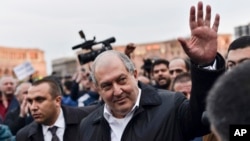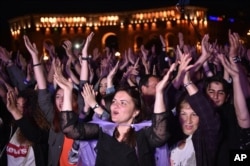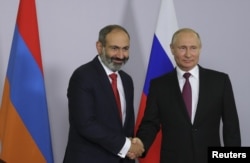Armenian President Armen Sarkissian said he is planning to push for constitutional changes to expand the powers of his office less than two months into his first term.
Speaking with VOA’s Armenian Service less than a month after Prime Minister Nikol Pashinyan rode to power on a wave of mass demonstrations that lasted weeks, Sarkissian said a constitutional imbalance is threatening to undermine Armenia’s stability as a nation.
“The reality is Armenia needs deeper changes to some of the laws in the constitution, and some laws related to the constitution,” he said. “Why? Because first of all, we don’t have a balanced constitution. We have a constitution where a lot of power — most of the power — is given to the government and the prime minister’s office.
“In Armenia, they call it a ‘super prime ministership,’” he added. “And Mr. Pashinyan was one of the first in the parliament, when he was ... one of the leaders of the opposition, to criticize this. And it’s not about Mr. Pashinyan or [former Prime Minister] Serzh Sargsyan or anybody else. It’s about keeping this country safe and sound and stable.”
Sargsyan served 10 years as president and was appointed prime minister in April after a series of constitutional changes reduced the role of the president and elevated the role of prime minister.
Protesters immediately condemned the move as a ploy to cling to power and demanded that he step down.
Sarkissian urged dialogue between his political ally, Sargsyan, and Pashinyan, the protest leader. Sarkissian was soon sworn in as president after being elected by parliament in March.
Political power in the South Caucus nation should be divided equally among parliament and offices of the president, the prime minister and his cabinet, Sakissian said.
“These changes are absolutely needed because we cannot afford to have a constitution and a system which is, in reality, not going to be stable,” he said. “The real power should be divided.”
Too soon to judge
Asked to assess Pashinyan’s performance since assuming the country’s most powerful office in May, Sarkissian said it would be it premature to judge.
“The government itself, the appointments of ministers, they're all new,” he said, adding that the new cabinet’s policy intentions appear to be “in the direction of what they [Pashinyan’s supporters] were promising.”
“But a month is too short,” he said. “If you are a prime minister, it takes a lot of time to [get] your administration intact, to have the right people around, to have the right message and start working.”
President Sarkissian also said that Prime Minister Pashinyan, who had long called for massive reforms on everything from human rights to transparent elections to government corruption, may still face an uphill battle in delivering on some of these promises.
“Indeed, Armenia needs reforms in many areas, in many directions,” he said, touching on the primary necessity of developing an economically vibrant nation that appeals to foreign investors.
If foreigners are to have the confidence to invest, he said, “you need a stable country where negative factors such as corruption are minimal.”
Regarding foreign policy, which is constitutionally delegated to Pashinyan, Sarkissian noted that Armenia values good relations with Russia.
“It is vital for Armenia. Armenia and Russia have proven that they have a track record of being good friends for centuries,” he added.
Military and political relations with Russia help Armenia “to keep the balance in the difficult neighborhood.”
And yet, he added, that does not mean Armenia cannot develop relations with the rest of the world in order to balance its historically close ties with Russia. Armenia, he said, is both a member of the Russian-led Eurasian Economic Union, while maintaining trade agreements with the European Union.
“We are the only country in the whole Eurasia, Europe and Asia that has that sort of relations,” he said. “That opens huge doors in Armenia for developing the economy and investment.”
This story originated in VOA's Armenian Service.









